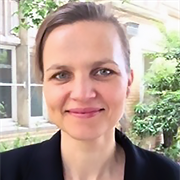
Dr. Emmanuelle Walkowiak
Details
-
Department: Economics Finance & Marketing
-
Campus: City Campus Australia
-
emmanuelle.walkowiak@rmit.edu.au
-
ORCID: 0000-0002-7153-614X
Open to
- Masters Research or PhD student supervision
About
Dr Walkowiak has two decades of experience as an economist studying how the rapid adoption of technologies drives the transformation of work and organizations. She is a Vice-Chancellor's Senior Research Fellow at RMIT and a research affiliate of the ARC Centre of Excellence for Automated Decision-Making and Society (ADM+S). Her current research analyses the impact of the digital transformation on the future of work and inclusion. More specifically, she focuses on the quality of working life of workers in a digital era, neurodiversity and the digital transformation of workplaces, inclusion/exclusion and AI, and mitigation of AI risks. In September 2023, she has launched the FLOW-GenAI (for Future of Labour, Organisation and Work with GenAI) initiative which is focused on the changing nature of work with Generative AI.
She was awarded a PhD in Economics by the University Paris IX-Dauphine (France) in 2005. Prof. Robert Solow (Nobel Prize of Economics, MIT) awarded her the Solow Fellowship from the Cournot Center for Research in Economics, for her research on how technology-human interactions are transforming work organisation.
Emmanuelle has a strong international background and has developped her research in the US (Princeton University), the UK (Westminster University), and France (University of Orleans, Dauphine, Paris 12 and Saclay).
Emmanuelle is passionate about guiding evidence-based decision on the use of technology by workers. She was part of a research group involved in the design and use of a French matched employer-employee survey (named in French Enquête COI - Changement Organisationel et Informatisation) on the use of IT and organisational change within workplaces. The Google Scholar profile for the survey measures its research impact through citations of researchers using it. Click here .
Emmanuelle was the principal investigator of several research projects in France and Europe (project COI-COSA on computerisation, organisation and IT; Evaluation of the efficiency of short-time work in France).
Industry experience:
Co-investigator (PI team) of a 3-year project on the diffusion of IT and reorganisations of the workplace (called COI-COSA) financed by the National Agency of Research (total budget EUR200,000 / AUD306,000). The National Agency of Research in France is equivalent to the ARC in Australia. This project involved an extensive co-ordination/collaboration with 4 research centres.
Principal Investigator of a project on the evaluation of the work-sharing program in France between 1995 and 2005, financed by the French Ministry of Labour and Employment (total budget EUR33,000 / AUD50,000)
Scientific coordinator for the CEET (Center for studies on employment and work) under the supervision of Professor N. Greenan of the European project WORKS (Work Organisation and Restructuring in a Knowledge Society), financed by the European Commission involving 13 EU countries (total budget EUR3.8M / AUD5.8M).
Media
Research fields
- 380111 Labour economics
- 441007 Sociology and social studies of science and technology
- 350705 Innovation management
- 440710 Research, science and technology policy
- 389903 Heterodox economics
UN sustainable development goals
- 10 Reduced Inequalities
- 8 Decent Work and Economic Growth
- 9 Industry, Innovation and Infrastructure
Teaching interests
During her career, Emmanuelle was a programme leader and was strongly involved in the development of new curricula and courses.
She was the Director of Bachelor of business and economics in France (450 students) and was the recipient of the learning and teaching award at La Trobe University in 2022 for the design and teaching of the course "Economics of Innovation". At La Trobe University, she was the PRME Champion (Principles of Responsible Management Education) for the discipline in economics in 2022.
She created, designed, developped several courses, such as Innovation Economics, Labour Economics, Employment Policy, Microeconomic Analysis and Policy, Theory of Organisation, Current issues in Business Economics, Conference on economic policy.
She taught more than 20 different courses at UG and PG levels in different Universities in France, the UK and Australia, including:
- At PG level: Regulation and Governance in the crypto-economy; Innovation Economics; Labour Economics; Employment policies; Principles of Economics; Research methodology in economics; Entrepreneurship and Management of Innovation; Microeconomic analysis and policy; Economics and theories of organisation; Current issues in Business Economics; Qualitative and quantitative workshops in Research Methods
- At UG level: Digital Business; Economics of Innovation; Innovation and market failures in a knowledge economy; Current Themes in Business; Supervision of international dissertations; Conferences on economics policies; Microeconomics: Theory and Application; Current issues in economics; Macroeconomics in closed economy; Macroeconomics in open economy; Economic methodology.
Research interests
Generative AI, Neurodiversity, Future of Work, Inclusion, AI risks


